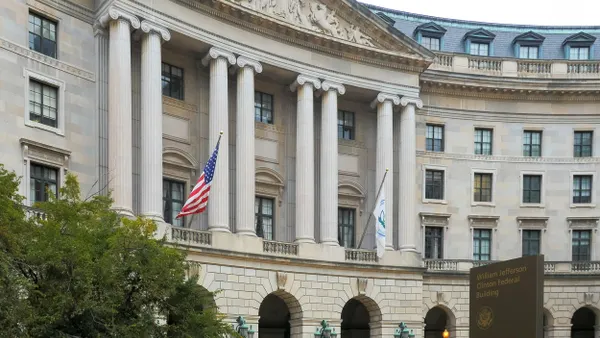UPDATE: May 31, 2019: Two bills collectively known as the California Circular Economy and Plastic Pollution Reduction Act have advanced in their respective legislative bodies. SB 54 passed in the Senate on May 29 and AB 1080 passed in the Assembly on May 30. Each bill will now head to the opposite legislative body for multiple rounds of committee votes — and possible amendments — before potentially coming up for a final concurrence vote that could send the legislation to Gov. Gavin Newsom by this fall.
Dive Brief:
- California legislators recently introduced a pair of bills (AB 1080 and SB 54) known as the California Circular Economy and Plastic Pollution Reduction Act that would establish a comprehensive plan to “reduce and recycle” 75% of single-use plastics by 2030.
- This bill takes a phased approach, calling for manufacturers of single-use plastic packaging or products distributed and sold in California to show a recycling rate of at least 20% by Jan. 1, 2022, and at least 40% by 2026. By 2030, all products would have to be "recyclable or compostable."
- In preparation, the legislation would require the Department of Resources Recycling and Recovery (CalRecycle) to create and approve a scoping plan about how to measure and achieve those targets by Jan. 1, 2021. It also calls for CalRecycle to develop criteria – based on requested data from the public and private sector – to determine which types of single-use packaging or products are reusable, recyclable, or compostable.
Dive Insight:
According to statistics cited by this new legislation, annual global plastic production has now risen to more than 335 million tons per year and California is currently recycling less than 15% of its single-use plastic. Following China's scrap import restrictions, the bill's authors state that "the cost to recycle plastics exceeds the value of scrap plastic material," and material is now being disposed as a result.
With the state's existing goal of reducing, recycling or composting 75% of all waste by 2020 also quickly approaching, California’s legislators are taking a two-chamber approach to dramatically reduce the amount of single-use waste generated in California.
“We have to stop treating our oceans and planet like a dumpster. Any fifth grader can tell you that our addiction to single-use plastics is killing our ecosystems,” said sponsor Assembly Member Lorena Gonzalez in a press release. “We have technology and innovation to improve how we reduce and recycle the plastic packaging and products in our state. Now, we have to find the political will to do so.”
“Every day Californians generate tons of non-recyclable, non-compostable waste that clog landfills, rivers, and beaches,” said State Senator Ben Allen, another co-sponsor. “The future of California’s quality of life is at stake. Rather than continue to tinker around the edges with one-off bans of individual plastic items, we need a thoughtful, comprehensive solution to address this serious problem head-on.”
Nonprofits such as the California Product Stewardship Council and Californians Against Waste also want the legislation to move forward.
“Single-use packaging has become a convenient and relatively inexpensive option to contain beverages and food products, but at a great cost to our environment,” said Doug Kobold, the organization’s executive director. “AB 1080 will help move California in the right direction by limiting the types of single-use plastic packaging and promote reusable packaging.”
Determining how to define the desired terminology will be among multiple key questions for legislators as the process continues. If passed, the legislation calls for CalRecycle to develop criteria – based on requested data from the public and private sector – to determine which types of single-use packaging or products are reusable, recyclable, or compostable.
SB 54 was read in committee for a second time and amended on Feb. 25, and AB 1080 could be heard in committee on March 24.
Both bills were introduced on Feb. 21, just two days before San Diego’s recent move to reduce single-use plastics and polystyrene foam products took effect. In January, Berkeley also passed its own bill to eliminate all single-use foodware by 2020.










